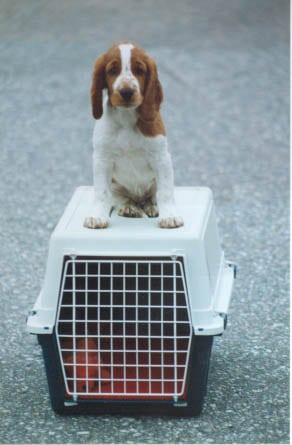I crate trained my first puppy years ago and have faced multiple issues, and the puppy whining in the crate was perhaps the one that almost drove me crazy. In this post, I want to share with you how some of the tips I’ve learned by crate training many puppies over the years.
Hopefully, you can learn from my mistakes, and make your crate training as easy and smooth as possible.
A puppy whining in his crate is totally normal in the first couple of weeks of the crate training process, especially at night, but with patience and good planning your dog will stop and get used to sleeping in his crate.
Why is my puppy whining in his crate?
The first question that comes to your mind is probably why is my puppy whining in his crate? This is logical thinking, as we want to know the why before taking any action.
There could be plenty of reasons why your puppy is whining in his crate.
Just like a baby, the puppy has no way of expressing complaints than to whine. It is up to us to understand why the puppy is whining.
Some reasons may be related to natural needs, like eliminating and food… while some are more about behavior and anxieties.
Natural needs
Puppies under the age of 36 weeks have a harder time controlling their bladder for long periods.
If you are crate training your young puppy and for longer hours than you should, there will be plenty of whining and potting incidents.
8 weeks old puppies can’t be in the crate for longer than an hour per session.
You also need to make sure the puppy has eliminated just before going in his crate to lower the need to potting breaks.
Food may also be a reason for the whining, if you don’t feed your puppy enough and lock him in the crate he will be whining, I mean who wouldn’t?
These natural needs are easy to deal with as the puppy will immediately stop whining when dealt with.
The best thing you can do is to make sure you’ve covered all of these needs before going in the crate. This way, when the puppy is whining in the crate you are positive it’s not about food or a potting break.
Lack of exercise
One of the most common mistakes made when crate training a puppy, is not exercising enough.
Puppies are very energetic animals. They do enjoy playing and running around.
Imagine you’ve just woke up after a long night sleep you are full of energy, and someone sends you back to bed.
You want to make sure to take down that energy by exercising the puppy enough before going to the crate.
Long walks and some play time is a great way to prepare your puppy for the crate. If you do this you’ve just eliminated two potential reasons for your dog to whine in the crate.
Resistance to the crate training

This one is really common especially in the first few days of the crate training. The puppy is not used yet to the crate so he will express complaints.
This kind of whining if dealt with correctly doesn’t take long to stop.
A crate is a new place for the puppy and a big change in his routine, so like any change, there is always some sort of resistance.
Confinement anxiety
The confinement anxiety also labeled “barrier frustration” is another reason for a puppy whining in his crate.
This is not widely common among puppies, and you may need an expert to confirm the diagnosis before you can assume it is.
However, here are some of the most obvious symptoms to help you spot it.
- These dogs don’t just ask for attention, they express panic when confined, and could keep crying and barking for hours.
- They keep chewing on the bars of the crate for long periods.
- They will paw at the crate trying to get out.
- Would salivate over themselves.
If you spot any of these symptoms, you may want to consult with your local veterinary.
You’re not doing a good job with the crate training
Crate training is an easy process if done correctly. However, doing it wrong could make the puppy resistant.
The idea behind the crate training is simple and straight forward. You want to make the crate a happy place so the puppy likes to be in it.
If you’re doing a lousy job with that, it is reasonable that your dong will be whining in the crate.
I have written an explicit simple step by step guide to crate training, you want to check out to make sure you’re doing it right.
Should you ignore puppy crying in the crate?
If you ever searched online or asked a dog trainer before about this. You probably had the same answer Ignore the puppy when whining in the crate.
This is in most cases correct. That being said there are a few exceptions so you don’t end up traumatizing your puppy.
Why ignore a puppy whining in the crate
The first thing you need to know is the logic behind this advice. You shouldn’t always take anything for granted.
The puppy when showing resistance to the crate mostly in the early phases of the crate training will use whining as a way to get you to let him leave.
If you let the puppy out while whining in the crate you prove to him that this is the way to get out.
Every time he wants out he will be whining for longer and longer periods of time until you do what he wants. Dogs are fairly smart if this works for the crate it won’t be long until he figures he could do this for anything he wants.
So when you let the puppy out while he is whining you are helping him acquire a very bad habit that will be a real pain to get rid of.
However, you can’t just ignore the puppy for whatever reason making him cry or whine.
When should you ignore the puppy while whining?
We saw earlier the reasons why would a puppy be whining in the crate. Of the multiple reasons we’ve pointed only one is valid with this procedure.
When the puppy is showing resistance to the crate. You can’t ignore a puppy that needs to eliminate or that is clearly freaking out since you’ve put him in the crate.
However no matter the reason try calming the puppy before letting him out.
We said in the previous section we don’t want the puppy to know that he can get what he wants by whining.
If you’ve had the puppy exercise enough before going in his crate, and made sure he had his potting break and he isn’t showing signs of confinement anxiety, then you can go ahead and ignore the puppy.
You really need to stand your ground; this is a battle of wills.
Don’t you feel guilty about doing this; there is no cruelty in crate training.
You can read my article about crate training cruelty where I’ve shown in details how it’s a great tool for your dog training and how when used correctly be a safe place that your puppy loves.
If you are following the steps correctly from the crate training guide, you should be experiencing some whining in the first few nights at most.
Puppy whining in crate all of a sudden
Now, this is a real pain if your dog is perfectly fine loving life in the crate been weeks, no sign of whining whatsoever. Then out of the blue, he just starts whining whenever you use the crate, that is confusing.
I honestly only had this once thankfully, but this is strangely common.
There is little information out there about the reasons that could be behind this sudden change of behavior.
For me, it was intestinal issues and she went back to her crate just fine after that.
I’ve been searching for some potential reasons that could help you if your dog is showing the same behavior.
Bad experience in the crate

I know what you’re thinking, I am always there my puppy has had no traumatizing experiences in his crate. Well, you can’t be sure something as simple as a windy night could make the puppy scared.
I found a woman whose dog was afraid of its reflection in the mirror across the hall.
You could spot this by its reaction when getting in the crate if the puppy is fine while you’re around and only whining when you go. Then he probably just got scared in there of something and is associating the incident whit the crate.
Usually making a few changes to the crate and maybe the location could be enough.
Also doing some playtime and treat rewards in the crate during the day could be helpful.
Intestinal issues
The one that made my dog whining in the crate, at first I was confused since I’ve never had this problem before and especially that my puppy had great potting training with almost no incidents.
You could if you notice some sudden whining try and take your puppy for a potting break, just keep it about that if he eliminates it’s probably going to go back to the way it was in a few days.
Whining from intestinal pain is a bit different compared to a scared puppy.
The crate isn’t clean
Dogs can pick up smells easily, maybe if you have some sort of a blanket in the crate which a advise against, it could be unclean.
Some dog owners have had great success just washing the crate thoroughly and changing the sheets inside.
You want to inspect the crate to see if there isn’t something sharp in there. Some low quality crates could have these kinds of problems.
In this case, changing the crate is necessary, don’t try and fix it.
The location
Sometimes changing the location of the crate can fix the problem. The dog may have seen something or just not like it in there for some reason.
This is the easier thing to try; you could even make a transition by your room for a few nights.
Puppy crying in the crate when left alone
This usually happens if you rush your dog in the crate training.
Some dogs show no resistance at first toward the crate so their owners just go ahead and start using the crate with no proper training.
If the dog is whining only when left alone, then it’s because he feels trapped.
There is a small chance it could be separation anxiety, but then you would notice as the puppy goes mad if you leave.
They are aggressive and often salivate a lot all over themselves.
If you do notice these symptoms you may want to consult an expert. However, if the puppy is just crying in the crate when you leave while doing fine when you are around you probably want to slow down with the crate.
Follow the crate training steps and try to associate some happy times with the crate.
Just because your dog won’t resist going into the crate does not mean he likes it.
Keep feeding the puppy his meals in the crate, and use treats.
Toys are also needed in this case; the Kong is great and will keep him busy.
If you have done everything as it should and taken things slowly but your dog is still crying inside just ignore it.
They will improve over time and learn to settle down in the crate.
Exercising before the crate is very helpful and reduces the dog’s will to play and move around. So he will be less likely to feel lonely and start crying.
Puppy screaming in crate for hours
Well bad news alert! That’s totally normal for a new puppy.
All you can do about it is get some earplugs and ignore the puppy until he gets used to his new home.
This is almost always a new puppy problem. The change in the puppy’s life makes him vulnerable.
You can ease this by keeping his crate next to your bed where he can see you. That won’t stop him from crying but he will get used to his new home faster.
Try to be as gentle as possible, playing games during the day and feeding in the crate and plenty of good treats.
The transition phase is always hard on smaller puppies.
It is better if you get your new puppy home while on vacation, so you can sleep it off during the day.
Patience is really your only option here and trying to bond with the puppy to speed things up.
Exercising a lot (make sure not to overdo it, it can hurt a puppy especially younger ones) so the puppy falls asleep faster.
This is basically all you can do, ignore it be patient and trying to bond with the puppy to get through faster.
Puppy won’t stop barking in crate at night
It is really frustrating when your puppy is barking in their crate at night. Because of this, you can’t get a good night sleep and if you live in an apartment; Regardless of how friendly your downstairs neighbor is. You are very likely to be given “the look”.
Granted this seems difficult to handle but there are actually some great simple tips you can use to stop your puppy from barking in their crate at night.
First, you want your dog’s crate to be within eye sight, so you can intervene when needed.
What we are trying to achieve is to break the puppy’s barking cycle by using interrupters to teach him gradually that barking in the crate at night is not allowed.
To illustrate this situation, you have placed your dog in his crate. You are ready to sleep your puppy starts barking non-stop.
All you have to do is call for them to get their attention. Usually, when you call for your puppy he will stop and try to identify the source of the voice.
Use that to your advantage and once he is silent praise him for it, and if the crate is within reach give treats.
Now if the dog is too self-absorbed to his cycle of barking, all you have to do is to tap on the side or top of the crate.
Again this sound will intrigue the dog, and when he is trying to investigate where the sound is coming from; Jump on the opportunity to praise him.
If you keep doing this every time the puppy starts barking he will eventually understand that barking is not allowed.
What can you do if the crate is within sight but a bit far from your reach?
You can use the leash and place the end of it on the crate’s door. Once you hear the puppy barking try moving it around and do the same process of communicating while the puppy is quite.






